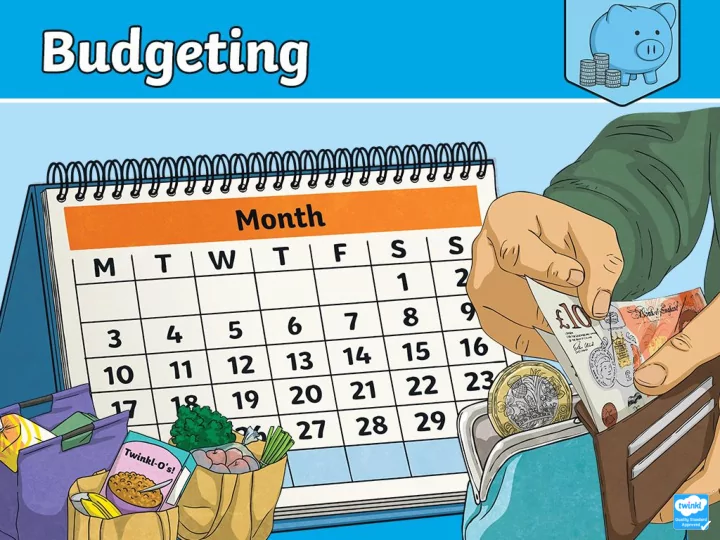

Aim Aim • I can explain why we need to budget and how we make one. Success Criteria Success Criteria • I can explain what a budget is. • Statement 1 Lorem ipsum dolor sit amet, consectetur adipiscing elit. • I can give reasons why we need to budget. • Statement 2 • I can discuss how we can make a budget. • Sub statement This resource is fully in line with the Learning Outcomes and Core Themes outlined in the PSHE Association .
The Big Questions Why might we need a budget? How might we make a budget?
What is a Budget? I would really like to go bowling with my friends however, now I’ve bought my bus ticket for the week and paid my library fine, I don’t have enough money in my budget. What does this mean? What is a budget?
Why Should We Budget? How much do you think each of these things might cost? Make a note of the estimated costs in your book.
Why Should We Budget? How much do you think each of these things might cost? Make a note of the estimated costs in your book. £10
Why Should We Budget? The money available for this month was £440. It is important to budget so we know how much money we have available to spend. This month, we could easily have spent a lot on the exciting events at the start of the month. Without a budget, we would not have enough money left for important things at the end of the month, like bills and rent.
How Can We Budget? To create our own budget for a month, we need to know certain things: How much money is available to us each month? • What regular payments will be needed throughout the month? • Finding these answers will allow us to know how much we have left available to spend. You might want to budget for a whole month or you might want to budget for a week at a time. If you choose to budget for a week at a time, it is important to find out what you need to spend for the whole month, then divide the remainder by four (for the amount of weeks you are budgeting for).
How Can We Budget? We are now going to create our own spending calendar. To do this we will need a budget for the month. On the website, you have a pack of budget cards . You need to use these to plan your spending for the month. You will record your learning on a spending calendar . You will need to look at your cards to work out: How much money is available to spend? What regular payments do you need to make, such as food shopping, rent and bills? What budget you can allow yourself each week?
How Can We Budget? Look at the calendar you have completed. Think about the following questions: If you could afford it, what will you do with any spare money you have? Could you afford all that you wanted to? If you couldn’t afford it, how did you prioritise your spending?
Income for Spending Now look again at your budget cards. Can you prioritise spending on the items you have? What should you spend money on first? Why? You now need to add up the costs of the items you feel are most important. Which of these jobs would mean you could cover your basic costs (food, rent, bills, council tax) and which jobs would allow you to have more money to spend on other items? What would you do with money you have left over? Cleaner Waiter Receptionist Security Guard £830 £760 £820 £780 a month a month a month a month
Spending Money You are now going to design your own poster to encourage people to budget. In your poster, you will need to include the following information: Why is it important to budget? How can people make a budget? What are the benefits to having a budget? money prioritise luxury want necessity need outgoings budget wages income spending
Why might we need a budget? How might we make a budget?
Aim Aim • I can explain why we need to budget and how we make one. Success Criteria Success Criteria • I can explain what a budget is. • Statement 1 Lorem ipsum dolor sit amet, consectetur adipiscing elit. • I can give reasons why we need to budget. • Statement 2 • I can discuss how we can make a budget. • Sub statement This resource is fully in line with the Learning Outcomes and Core Themes outlined in the PSHE Association .
Recommend
More recommend